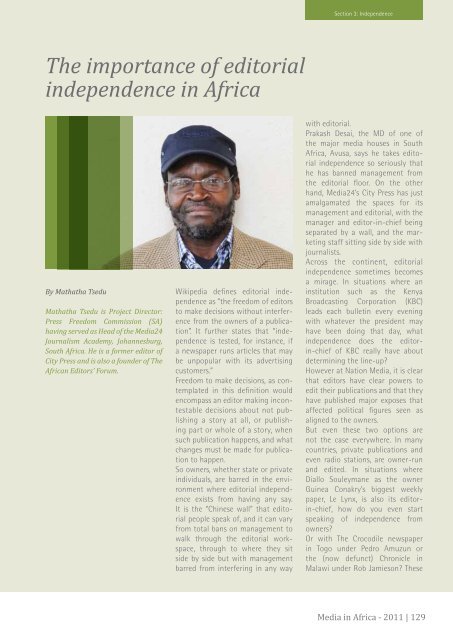Twenty years after the Windhoek Declaration on press freedom
Twenty years after the Windhoek Declaration on press freedom
Twenty years after the Windhoek Declaration on press freedom
You also want an ePaper? Increase the reach of your titles
YUMPU automatically turns print PDFs into web optimized ePapers that Google loves.
The importance of editorial<br />
independence in Africa<br />
By Mathatha Tsedu<br />
Mathatha Tsedu is Project Director:<br />
Press Freedom Commissi<strong>on</strong> (SA)<br />
having served as Head of <str<strong>on</strong>g>the</str<strong>on</strong>g> Media24<br />
Journalism Academy, Johannesburg,<br />
South Africa. He is a former editor of<br />
City Press and is also a founder of The<br />
African Editors’ Forum.<br />
Wikipedia defines editorial independence<br />
as “<str<strong>on</strong>g>the</str<strong>on</strong>g> <strong>freedom</strong> of editors<br />
to make decisi<strong>on</strong>s without interference<br />
from <str<strong>on</strong>g>the</str<strong>on</strong>g> owners of a publicati<strong>on</strong>”.<br />
It fur<str<strong>on</strong>g>the</str<strong>on</strong>g>r states that “independence<br />
is tested, for instance, if<br />
a newspaper runs articles that may<br />
be unpopular with its advertising<br />
customers.”<br />
Freedom to make decisi<strong>on</strong>s, as c<strong>on</strong>templated<br />
in this definiti<strong>on</strong> would<br />
encompass an editor making inc<strong>on</strong>testable<br />
decisi<strong>on</strong>s about not publishing<br />
a story at all, or publishing<br />
part or whole of a story, when<br />
such publicati<strong>on</strong> happens, and what<br />
changes must be made for publicati<strong>on</strong><br />
to happen.<br />
So owners, whe<str<strong>on</strong>g>the</str<strong>on</strong>g>r state or private<br />
individuals, are barred in <str<strong>on</strong>g>the</str<strong>on</strong>g> envir<strong>on</strong>ment<br />
where editorial independence<br />
exists from having any say.<br />
It is <str<strong>on</strong>g>the</str<strong>on</strong>g> “Chinese wall” that editorial<br />
people speak of, and it can vary<br />
from total bans <strong>on</strong> management to<br />
walk through <str<strong>on</strong>g>the</str<strong>on</strong>g> editorial workspace,<br />
through to where <str<strong>on</strong>g>the</str<strong>on</strong>g>y sit<br />
side by side but with management<br />
barred from interfering in any way<br />
Secti<strong>on</strong> 3: Independence<br />
with editorial.<br />
Prakash Desai, <str<strong>on</strong>g>the</str<strong>on</strong>g> MD of <strong>on</strong>e of<br />
<str<strong>on</strong>g>the</str<strong>on</strong>g> major media houses in South<br />
Africa, Avusa, says he takes editorial<br />
independence so seriously that<br />
he has banned management from<br />
<str<strong>on</strong>g>the</str<strong>on</strong>g> editorial floor. On <str<strong>on</strong>g>the</str<strong>on</strong>g> o<str<strong>on</strong>g>the</str<strong>on</strong>g>r<br />
hand, Media24’s City Press has just<br />
amalgamated <str<strong>on</strong>g>the</str<strong>on</strong>g> spaces for its<br />
management and editorial, with <str<strong>on</strong>g>the</str<strong>on</strong>g><br />
manager and editor-in-chief being<br />
separated by a wall, and <str<strong>on</strong>g>the</str<strong>on</strong>g> marketing<br />
staff sitting side by side with<br />
journalists.<br />
Across <str<strong>on</strong>g>the</str<strong>on</strong>g> c<strong>on</strong>tinent, editorial<br />
independence sometimes becomes<br />
a mirage. In situati<strong>on</strong>s where an<br />
instituti<strong>on</strong> such as <str<strong>on</strong>g>the</str<strong>on</strong>g> Kenya<br />
Broadcasting Corporati<strong>on</strong> (KBC)<br />
leads each bulletin every evening<br />
with whatever <str<strong>on</strong>g>the</str<strong>on</strong>g> president may<br />
have been doing that day, what<br />
independence does <str<strong>on</strong>g>the</str<strong>on</strong>g> editorin-chief<br />
of KBC really have about<br />
determining <str<strong>on</strong>g>the</str<strong>on</strong>g> line-up?<br />
However at Nati<strong>on</strong> Media, it is clear<br />
that editors have clear powers to<br />
edit <str<strong>on</strong>g>the</str<strong>on</strong>g>ir publicati<strong>on</strong>s and that <str<strong>on</strong>g>the</str<strong>on</strong>g>y<br />
have published major exposes that<br />
affected political figures seen as<br />
aligned to <str<strong>on</strong>g>the</str<strong>on</strong>g> owners.<br />
But even <str<strong>on</strong>g>the</str<strong>on</strong>g>se two opti<strong>on</strong>s are<br />
not <str<strong>on</strong>g>the</str<strong>on</strong>g> case everywhere. In many<br />
countries, private publicati<strong>on</strong>s and<br />
even radio stati<strong>on</strong>s, are owner-run<br />
and edited. In situati<strong>on</strong>s where<br />
Diallo Souleymane as <str<strong>on</strong>g>the</str<strong>on</strong>g> owner<br />
Guinea C<strong>on</strong>akry’s biggest weekly<br />
paper, Le Lynx, is also its editorin-chief,<br />
how do you even start<br />
speaking of independence from<br />
owners?<br />
Or with The Crocodile newspaper<br />
in Togo under Pedro Amuzun or<br />
<str<strong>on</strong>g>the</str<strong>on</strong>g> (now defunct) Chr<strong>on</strong>icle in<br />
Malawi under Rob Jamies<strong>on</strong>? These<br />
Media in Africa - 2011 | 129












